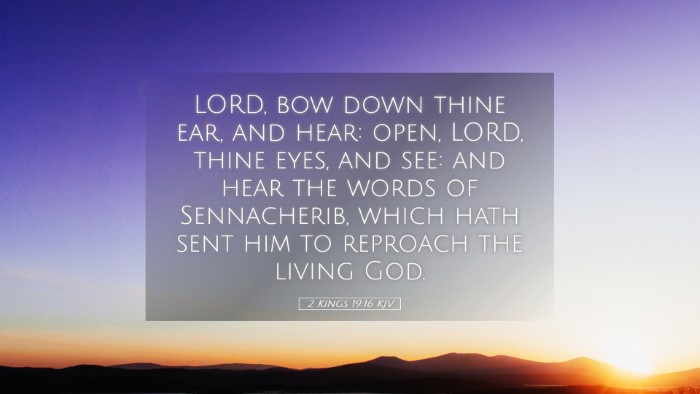Commentary on 2 Kings 19:16
Verse: "Incline your ear, O Lord, and hear; open your eyes, O Lord, and see; and hear all the words of Sennacherib, which has been sent to reproach the living God."
This verse is part of a prayer by King Hezekiah of Judah, seeking divine intervention in the face of a dire threat from the Assyrian king, Sennacherib. The context of this plea reveals theological insights that are vital for understanding God’s sovereignty, the nature of prayer, and the historical circumstances of Israel's struggle.
Contextual Background
The historical setting of 2 Kings 19:16 unfolds during a tumultuous time for Israel, marked by the expansion of the Assyrian Empire. Sennacherib had launched a campaign against Judah, threatening both its cities and its faith. He had sent a message to Hezekiah, mocking the God of Israel and assuring him of destruction, citing the downfall of other nations. This provocation served to amplify Hezekiah’s urgent need to reaffirm Israel’s dependence on God.
Theological Significance
Divine Attention and Prayer
Hezekiah’s appeal begins with a call for God to “incline your ear” and “open your eyes.” This phrasing underscores the belief in a personal relationship with God, recognizing His omnipotence yet expressing a need for His active engagement. As Albert Barnes points out, this illustrates a dual aspect of prayer: the acknowledgment of God's transcendence and the expectation of His immanence in human affairs.
The Nature of God
Hezekiah's recognition of God as "the living God" emphasizes God's active role in history as opposed to the lifeless idols of the surrounding nations. Adam Clarke comments that this distinction highlights the futility of false gods contrasted with the transformative power of the true God. This acknowledgment not only encourages the faithful but serves as a rallying cry for community solidarity in faith.
Specific Requests in Prayer
The prayer is remarkably succinct yet profound, incorporating two significant requests:
- Hearing the Reproaches: Hezekiah asks God to hear the words of Sennacherib, which not only pertain to the threats against Judah but involve an affront to God Himself. This aspect aligns with Matthew Henry’s perspective that any blasphemy against God warrants divine attention and response.
- Seeing the Plight: The request for God to see their situation is equally important, emphasizing the need for recognition of affliction and the immediacy of the threat. This plea reflects a deep sense of desperation, as Hezekiah seeks reassurance in God's attentiveness to their suffering.
Implications for Believers
The prayer is both a lesson and encouragement for contemporary believers. It affirms that in times of crisis, turning to God with our specific needs and sorrows is paramount. Hezekiah exemplifies a model for prayer that combines humility, urgency, and faith. Augustine once said, "God bids that we ask of Him, and in asking we shall receive," encapsulating the essence of the interaction depicted in this verse.
Lessons for Pastors and Theologians
For pastors and theologians, the verse offers a rich source for preaching and teaching:
- The Importance of Prayer: This incident reflects the necessity of prayer not only as a ritual but as a vital communion with God that influences the course of history.
- The Response of God: Highlighting God’s readiness to listen and see, the commentary suggests the assurance that God is actively involved and responsive to the prayers of His people.
- Theological Dimensions: Educators can explore the attributes of God illustrated herein—His omnipotence, His compassion, and His personal relationship with humanity.
Conclusion
In conclusion, 2 Kings 19:16 is a pivotal moment in the narrative of Hezekiah’s reign, embodying profound truths about prayer, divine attention, and the living nature of God. As believers reflect on this verse, they are encouraged to approach God with confidence in His willingness to hear and engage with their struggles, reinforcing the reality that He remains an active participant in the unfolding story of their lives.


